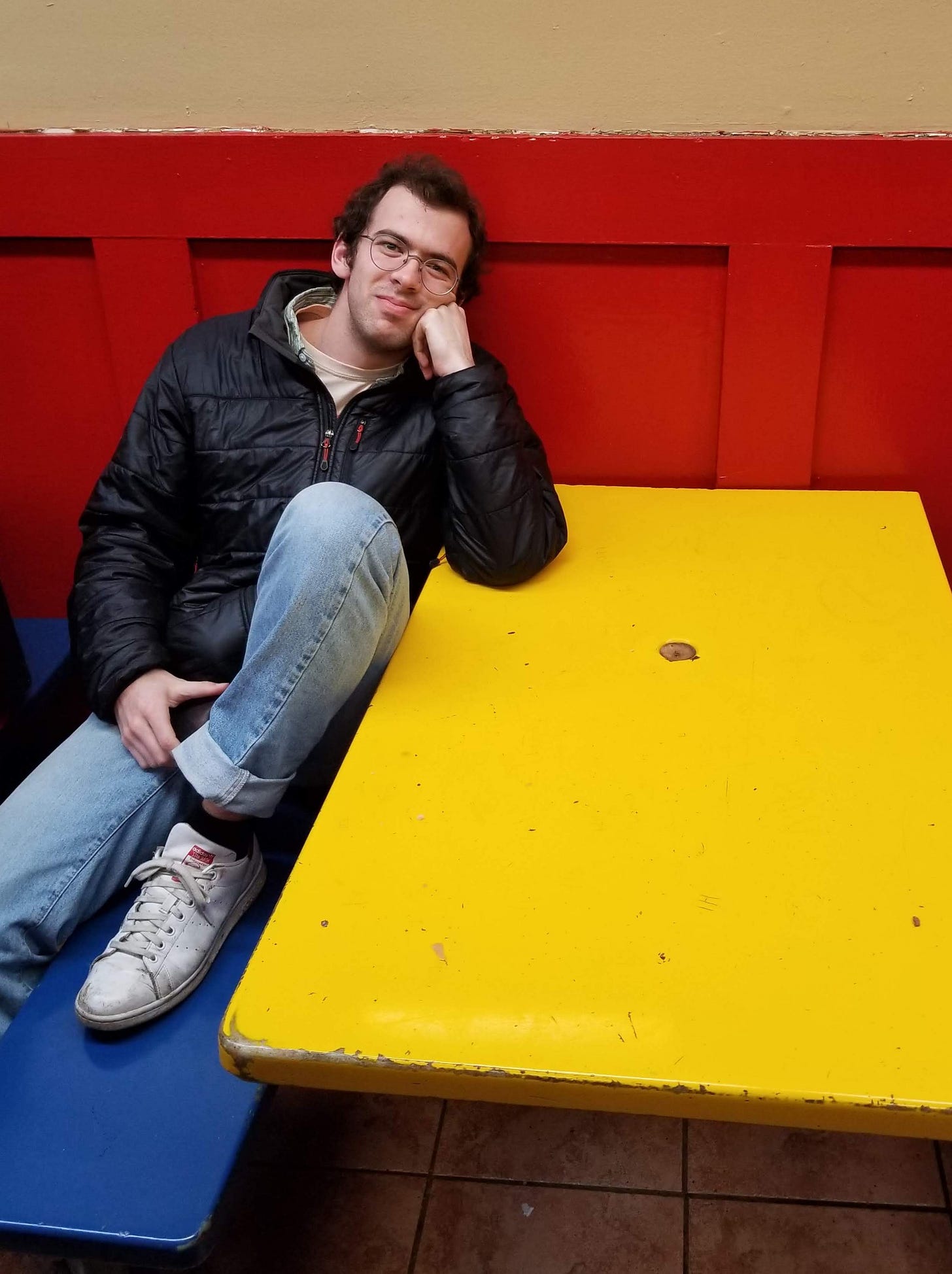Meet the Reboot Editorial Board
About our team + who/how to pitch
I’m thrilled to introduce the six new people joining Reboot’s editorial board: Ashwin Ramaswami, Jacob Kuppermann, Hal Triedman, Humphrey Obuobi, Lila Shroff, and Tianyu Fang.
Many of them have already been involved in Reboot as community members and contributors; and all are thoughtful, brilliant, and passionate people who I trust to broaden our coverage, deepen our rigor, and expand our perspective with their work.
I asked each editor to share a bit about themselves, plus a favorite piece of tech writing. (Exciting bonus: everyone here is open for pitches!)
Ashwin Ramaswami
he/him · twitter · ashwin at joinreboot dot org
Hi, I'm Ashwin!! I’m from Johns Creek, GA and am currently pursuing a J.D. degree at Georgetown Law. I come from a computer science background at Stanford. I love to learn about religion and Eastern philosophy and read science fiction.
My work touches on topics including public interest technology, law and policy, digital humanities, cybersecurity, and philanthropy, which I hope to cover. I also like thinking about open source software communities and governance; power dynamics around big tech and AI; and what the history of ancient technologies, from writing to agriculture, can teach us about the development of technology today.
I just read “Restricted Code,” and it's fascinating—I like how it explains the real transformative potential of Sanskrit grammar in a clear way, but at the same time cuts through the AI/Sanskrit hype and connects India's contemporary focus on AI/Sanskrit to colonialism and other phenomena.
Jacob Kuppermann
they/them · website · twitter · bluesky · jacob at joinreboot dot org
Hi! I am a writer, editor, and ecologist based in Vancouver, British Columbia. In my day-to-day, I am an assistant editor and communications coordinator at The Long Now Foundation and a BIJOCSM organizer at IfNotNow. In past lives I’ve been a music critic, an advocate for fossil fuel divestment, and a master’s student in environmental science. I also have two cats named Lila and Lenu, and will send a picture of them to anyone who emails me with a pitch.
At Reboot, I aim to cover—and am interested in pitches on(!)—the climate & our techno-social responses to it, the strange excesses of the online musical economy, unexpected fragments of tech history, and whatever else seems of interest.
“The Salt of the Cosmos” from Tal Milovina is one of my favorite pieces of writing at the intersection of the environment and technology. It’s dazzling both formally and conceptually—using lithium as a connecting thread, it draws lines between different parts of the digital experience from the hyper-material world of resource extraction to more nebulous, almost hallucinatory visions of decentralized communities and ghosts in the machine.
Hal Triedman
he/him · website · twitter · bluesky · hal at joinreboot dot org
Hi! I’m a technologist, writer, activist, and musician based in Denver, Colorado. In my day job, I work as a Senior Privacy Engineer at the Wikimedia Foundation.
As a Reboot contributing editor, I hope to cover security, privacy, histories of technology, the political economy of the tech industry, and technological ideologies. I’m open for pitches on those topics (and any others!!!).
I absolutely LOVE the Quanta essay about June Huh, the 2022 Fields Medalist. I like a lot of things that Quanta produces, but this piece stands out to me, because of the care that goes into showing June Huh not as a stratospheric genius (which he clearly is), but as a thoughtful, curious, and humble thinker. I also love the way that it shows mathematics research as a messy process, full of roads-not-taken and unexpected isomorphisms, rather than the sterile proofs that we often become acquainted with in math classes. Finally (and this is typical for Quanta), I really love the graphical illustration/explanation of the cutting-edge of math research. As a practice, it feels very respectful to the reader's intellect.
Humphrey Obuobi
he/they · twitter · humphrey at joinreboot dot org
Hello there! I am a designer, organizer, and technologist based in San Francisco. For the past few years, I was running public data program at a criminal justice nonprofit called Recidiviz; now, I run LETS Studio, a creative studio that supports democratic, community-led innovation in the Bay Area. I’ll also be starting a Masters of Public Policy at UC Berkeley in the fall.
For Reboot, I’ll be convening hearts and minds around the idea of “civic infrastructure,” a term I use to describe the tools and spaces—both digital and physical—that communities use to coordinate social change.
"Nameless Feeling” by Ludwig Yeetgenstein is the kind of read that shocked me into paying attention to something that I never thought to challenge: the idea of “vibes,” and the existential risk of failing to look beyond them. Technically, it does an excellent job of tracing a phenomenon from its technological origins (machine learning algorithms) to its social implications (passive attraction to hand-wavy feelings); by the end, I felt resolved to move more intentionally in my daily life and pay attention to the details. Good writing feels like it should change you somehow, and this definitely did it for me.
Lila Shroff
she/her · twitter · substack · lila at joinreboot dot org
Hi, I’m Lila! I’m a writer and a rising junior at Stanford. Currently, I am working on Responsible AI governance efforts as a Policy Fellow at Credo AI. At Stanford, I am an inaugural member of the Technology Ethics and Policy fellowship, and this past year, I co-led a student group at the Human-Centered AI Institute exploring AI and the future of creative expression. I love fiction writing and am currently working on a short story about memory, aging, and art.
I can’t wait to cover all things arts, media, and policy. I am very open (and eager) for pitches, think: artists exploring technology in provocative ways, media creation tools you wish existed, and fiction that changes the way you think about technology.
I love Vauhini Vara’s award-winning essay “Ghosts,” an early attempt at experimenting with AI in creative writing, and her debut novel, The Immortal King Rao, a 2023 Pulitzer Prize finalist, which charts a gripping parallel history of technology. What I appreciate about Vara’s work is that she is both an incredible fiction writer and a tech journalist—and she uses her skills in each of these domains to inform her work in the other. I can’t wait for her forthcoming essay collection, Searches, a collection of personal and cultural essays that explore “the rapidly changing ways we express ourselves online, the future of language in the age of AI, and how late-stage techno-capitalists profit from it all.”
Tianyu Fang
he/him · website · twitter · substack · bluesky · tianyu at joinreboot dot org
Hi, I’m Tian. I’m a writer, researcher, and technologist. Previously, I was part of Chaoyang Trap, a newsletter about life on the Chinese internet. Currently, I’m studying political science at Stanford University.
I’m broadly curious about online culture, tech history, and technocratic ideologies. At Reboot, I’m excited to cover global implications and transnational productions of technology. If you have an idea—even if it’s just a sentence or two—please reach out!
The history of technology teaches us two lessons. First, what now seems novel isn’t really new; and second, what we take for granted now was never an inevitable outcome. From this perspective I enjoyed Ben Tarnoff’s Internet for the People, a highly readable and critical assessment of the advent of the web—one that made me curious about the alternative internets we’d be living on had different policy choices been made.
And two reintroductions…
Jessica Dai
she/her · website · twitter · jessica at joinreboot dot org
I'm a PhD student in computer science at UC Berkeley; I work broadly on (the societal implications of) machine learning and artificial "intelligence." With Jasmine, I co-founded Reboot back in 2020; since then, I've been in a variety of roles including newsletter editor, Kernel managing editor and editor-in-chief, and "try to properly pay taxes to the state of California" person. I really enjoy good fruit and the performing arts.
Pitch me (after September) about anything! Some more specifics: I'm always curious about how the cultures and social dynamics of intellectual communities shape the substance of the work that gets produced. Personal essay/narrative, especially braided with/ reflecting on work you've done in the past. I'd especially encourage academics—students or otherwise—to think about research-informed opinion pieces with general-audience relevance (all those hot takes you can't put in something peer-reviewed...). Things I enjoy but know less about: beauty/aesthetic, fashion, food, ~ identity ~....
It probably means something that, more than five years later, the first title that comes to mind is “It Was Raining in the Data Center” by Everest Pipkin. It was summer 2018, when Medium was still the place for new, exciting essays; I was nineteen, bored to tears at my first tech job. I remember being blown away by the possibility of understanding the internet, which I mostly thought of as amorphous and intangible, as connected to real, physical systems with material stakes. Reading this was the first time I really understood what the project of creative and critical nonfiction writing was about, the first time I really felt like there might yet still be something interesting in technology.
Jasmine Sun
she/her · substack · twitter · jasmine at joinreboot dot org
Hi! I’m a cofounder and co-editor-in-chief of Reboot. I'm currently most excited about designing better social and information ecosystems, which I work on in my day job as a product manager at Substack. In the past, I’ve held roles across the civic innovation ecosystem: tech policy research at Schmidt Futures, disaster resilience products at One Concern, public interest tech curricula at Stanford, and sustainability advocacy at the ICDI. I graduated from Stanford with a degree in sociology, and am happily based in San Francisco.
I’m most interested in publishing profiles, personal essays, and interviews related to theories of change: the people, movements, products, and policies attempting to make tech meaningfully better. I believe it requires far more rigor and courage to defend something than to critique it, and am excited to hear from anyone who’s up for the challenge.
A book that’s stayed with me is sociologist and computer scientist Zeynep Tufekci's Twitter and Tear Gas. She applies a UX designer’s meticulous eye to show how platform affordances shaped 21st century activism from Hong Kong to Gezi Park, sharing generalizable takeaways that are valuable for organizers and tech builders alike. (I also discuss my other favorite pieces of tech writing in this essay.)
These are the eight voices you’ll be hearing from in the newsletter and shaping its vision over the next year. I can’t wait to see what everyone comes up with—please share or sign up if you’re excited as I am :)
💝 closing note
I want to extend one more thank you to Reboot’s prior core team: Emily Liu, Matthew Sun, Ivan Zhao, Jake Gaughan, and Lucas Gelfond. In their work on launching and running the student fellowship, Kernel Magazine, and more, this group has contributed countless hours and incredible ingenuity to make Reboot the organization it is today.
In other news: Are you a (human) illustrator with experience creating small digital portraits? We’re looking to hire someone to create signature avatars for our editorial team! Please reply or contact me if you have leads.
Onward and upward,
Jasmine & Reboot team











thanks for sharing, Jasmine & Jessica 🙏🏼
i'm a new subscriber to Reboot... and i'm happy to read about your mission... "reclaiming techno-optimism for a better collective future."
congrats on your promising team/ editorial board... ⚡️
i've been building & running 'open to change' in NY, since to 2000... turning art into meaningful, social impact. i'd love to share more if you're interested...
i'd also like to put my recent post (re: digital heroin) on your radar. https://opentochange.substack.com/p/growing-up-before-digital-heroin
why doesn't reboot hq have a pfp